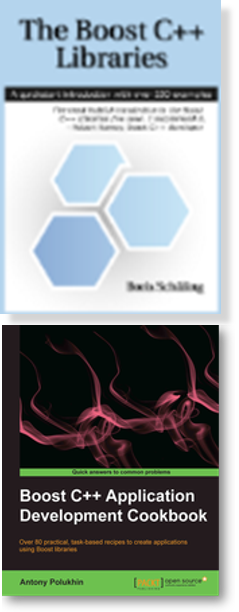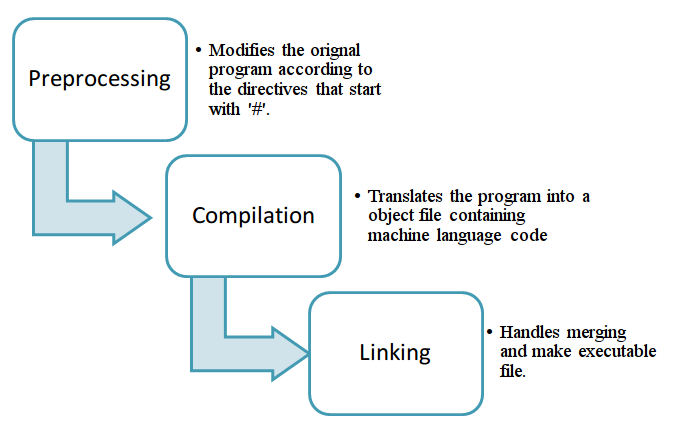The best of Boost, and using Boost the best
 Well timed with the recent release of Boost 1.55, a new Reddit thread just highlighted two useful books about Boost:
Well timed with the recent release of Boost 1.55, a new Reddit thread just highlighted two useful books about Boost:
The first book is available online, with a second edition released in print in 2011:
The Boost C++ Libraries
by Boris Schäling
Table of Contents
- Chapter 1: Introduction
- Chapter 2: Smart Pointers
- Chapter 3: Function Objects
- Chapter 4: Event Handling
- Chapter 5: String Handling
- Chapter 6: Multithreading
- Chapter 7: Asynchronous Input and Output
- Chapter 8: Interprocess Communication
- Chapter 9: Filesystem
- Chapter 10: Date and Time
- Chapter 11: Serialization
- Chapter 12: Parser
- Chapter 13: Containers
- Chapter 14: Data Structures
- Chapter 15: Error Handling
- Chapter 16: Cast Operators
The second, the subject of the Reddit thread, was this new release:
Boost C++ Application Development Cookbook
by Antony Polukhin
Overview
- Explores how to write a program once and then use it on Linux, Windows, MacOS, and Android operating systems
- Includes everyday use recipes for multithreading, networking, metaprogramming, and generic programming from a Boost library developer
- Take advantage of the real power of Boost and C++ to get a good grounding in using it in any project
Table of Contents
- Preface
- Chapter 1: Starting to Write Your Application
- Chapter 2: Converting Data
- Chapter 3: Managing Resources
- Chapter 4: Compile-time Tricks
- Chapter 5: Multithreading
- Chapter 6: Manipulating Tasks
- Chapter 7: Manipulating Strings
- Chapter 8: Metaprogramming
- Chapter 9: Containers
- Chapter 10: Gathering Platform and Compiler Information
- Chapter 11: Working with the System
- Chapter 12: Scratching the Tip of the Iceberg

 Trust Eric Niebler to deliver the goods -- when it comes to insightful discussion, cool code, and shameless puns:
Trust Eric Niebler to deliver the goods -- when it comes to insightful discussion, cool code, and shameless puns: A nice short overview of when you might want your associative container to use a contiguous implementation instead of a tree under the covers:
A nice short overview of when you might want your associative container to use a contiguous implementation instead of a tree under the covers: An interesting question was asked recently on StackOverflow that nicely ties in with Scott Meyers' "Effective C++11/14 Sampler" talk two months ago at GoingNative 2013 and the interestingly named feature
An interesting question was asked recently on StackOverflow that nicely ties in with Scott Meyers' "Effective C++11/14 Sampler" talk two months ago at GoingNative 2013 and the interestingly named feature  Life'n'gadget just published a nice overview of the basic C++ compilation model, useful for people who are new to programming in C++.
Life'n'gadget just published a nice overview of the basic C++ compilation model, useful for people who are new to programming in C++.